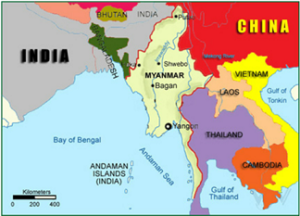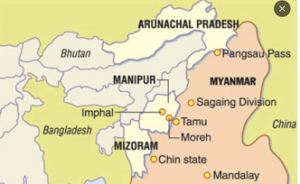India’s Myanmar quandary, its paradoxical policy.
Relevance:
Prelims: Location and Mapping
Mains: India and its neighborhood- relations
Context:
The article highlights Myanmar’s recent pivotal events – an unjustified ’emergency’ extension, superficial prisoner releases, and Aung San Suu Kyi’s house arrest. Despite these gestures, it argues that genuine democracy remains elusive due to military control, delayed elections, and India’s paradoxical policy stance. India, for its part, must be careful not to support the junta’s actions, but rather work to promote democracy and human rights in Myanmar.
What are the key situations that are unfolding in Myanmar today?
- The military junta has extended the state of emergency in Myanmar for another six months. This is in violation of the 2008 Constitution, which allows for a maximum of one year of emergency rule.
- The junta has justified the extension of the emergency by saying that it is necessary to establish “normalcy” in the country. However, the ACLED data (Armed Conflict Location & Event Data Project) project reports that Myanmar civilians witness two and a half times more violence than those in Afghanistan.
- The military regime has been conducting a relentless campaign of airstrikes and ground attacks against civilians in areas where it does not have control. In 2023, there have been an average of over 30 airstrikes per month.
- The Tatmadaw, the Myanmar military, only exerts real control in 30%-40% of the territory. This means that the junta is not in a position to hold free and fair elections in the near future.
- The reshuffling within the military-backed Union Solidarity and Development Party (USDP) is aimed at adding more military hard-liners. This further raises concerns about the junta’s commitment to democracy.
- The National League for Democracy (NLD), the party that won the 2020 elections, has decided not to participate in the new elections. This leaves the USDP as the only viable opposition party.
- The junta’s decision to reduce Ms. Suu Kyi’s sentence and shift her from prison is a symbolic gesture that is not a step towards democracy. Ms. Suu Kyi remains the rallying point for political change in Myanmar, and her return could potentially split the NUG-led resistance.
- The junta’s symbolic gestures are aimed at easing international pressure and allowing the military to claim progress. They may also offer political bandwidth and a face-saving token to actors engaging with the junta, such as India.
| The Armed Conflict Location & Event Data Project (ACLED) is a robust and sophisticated initiative that systematically gathers, analyzes, and maps data related to various forms of political violence and conflict events occurring worldwide. ACLED’s comprehensive database encompasses details about conflicts, protests, riots, and other significant events, including information on dates, locations, parties involved, fatalities, and outcomes. By providing accurate and up-to-date information, ACLED contributes to a deeper understanding of conflict dynamics and aids in informed decision-making for researchers, policymakers, journalists, and the public. |
What are the Concerns for India?
Security Challenges: Myanmar’s political instability and conflict pose security challenges along the shared border, potentially leading to cross-border violence, refugee influx, and insurgent activities affecting India’s northeastern states. Border communities defied the Home Ministry, sheltering Myanmar refugees despite concerns. This can create serious problems especially in the disturbed Manipur region.
Humanitarian Crisis: The ongoing crisis in Myanmar could result in a humanitarian catastrophe, with a potential influx of refugees into India, straining resources and infrastructure.
Strategic Influence: China’s growing influence in Myanmar through initiatives like the China-Myanmar Economic Corridor could impact India’s regional strategic interests and access to the Bay of Bengal.
Trade Disruptions: Instability in Myanmar may disrupt India’s trade routes and economic ties with Southeast Asian nations through land connectivity, affecting India’s Act East Policy.
Counterterrorism Efforts: Political turmoil in Myanmar might hinder joint counterterrorism efforts, allowing extremist groups to exploit the situation and potentially affecting India’s security.
Ethnic and Religious Tensions: Unresolved ethnic conflicts in Myanmar could spill over into India, exacerbating existing ethnic and religious tensions in border regions.
Diplomatic Challenges: India’s stance on Myanmar, especially regarding democracy and human rights, could strain diplomatic relations with both Myanmar’s military junta and international partners.
Way Forward:
Cease all arms sales to the military junta: Concerningly, reports from entities like Justice for Myanmar, SAC-M, and the United Nations Special Rapporteur indicate a rise in India’s provision of arms to the military following the coup. This act of arming the Tatmadaw not only contradicts India’s stance on democracy restoration but also exacerbates tensions, leading to spillage of conflicts across the border.
Increase humanitarian assistance to the people of Myanmar: The coup has caused a humanitarian crisis in Myanmar, with millions of people displaced from their homes and in need of food, medicine, and shelter. India should increase its humanitarian assistance to the people of Myanmar to help them cope with the crisis.
Support the Association of Southeast Asian Nations’ (ASEAN) Five-Point Consensus: The ASEAN Five-Point Consensus is a plan for resolving the crisis in Myanmar. It calls for an immediate end to violence, the start of a dialogue between the junta and the opposition, the release of political prisoners, and the formation of a government that is inclusive of all stakeholders. India should support the ASEAN Five-Point Consensus and work with other ASEAN countries to implement it.
Engage with the National Unity Government (NUG): The NUG is the democratically elected government of Myanmar that was overthrown by the coup. India should engage with the NUG and support its efforts to restore democracy in Myanmar.
Press the junta to restore democracy: India should continue to press the junta to restore democracy in Myanmar. The junta has shown no signs of willingness to do so, but India should continue to make its voice heard.
Prelims Mapping:
Soource: https://nenow.in/north-east-news/mizoram/indo-myanmar-border-demarcation-on-the-cards.html
Mains Question:
Q. Analyze how India’s policy choices in the context of the Myanmar crisis have implications for regional stability, border security, and its commitment to democracy, while also exploring potential avenues for fostering constructive bilateral engagement.





